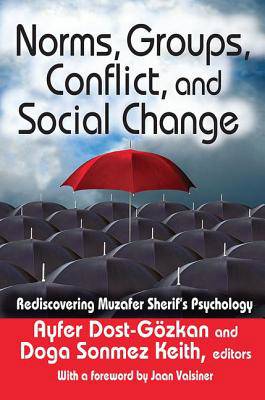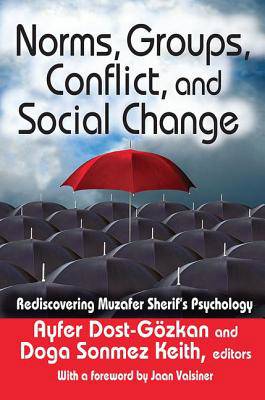
- Retrait gratuit dans votre magasin Club
- 7.000.000 titres dans notre catalogue
- Payer en toute sécurité
- Toujours un magasin près de chez vous
- Retrait gratuit dans votre magasin Club
- 7.000.0000 titres dans notre catalogue
- Payer en toute sécurité
- Toujours un magasin près de chez vous
Norms, Groups, Conflict, and Social Change
Rediscovering Muzafer Sherif's Psychology
Ayfer Dost-GozkanDescription
This book is about the life and work of a Turkish-American social scientist, Muzafer Sherif (1905-1988). He was known for his seminal work on norm and group formations, social judgment, and intergroup conflicts and cooperation. Although Sherif is identified as one of the founders of social psychology, his contribution to the science of psychology goes beyond the limits of social psychology as it is generally defined today.
This volume aims to rediscover the theory and research of its subject in the socio-historical context of his time, as well as his relevance for contemporary psychology. Chapters cover a range of topics: an in-depth portrayal of Sherif's life and intellectual struggle in Turkey and in the United States; his metatheoretical considerations on the science of psychology; his theory and research on group and intergroup relationships, social norms and social change; formation and change of frames of reference, ego-involvements and identity; and psychology of slogans.
Sherif had profound life experiences in different cultural contexts from the Ottoman Empire and World War I to American universities, which enabled him to see the essentiality of the historico-cultural context in the formation of human phenomena. Sherif's psychology is an elegant exemplar of an integrative science of psychology that is worth rediscovering.
Spécifications
Parties prenantes
- Auteur(s) :
- Editeur:
Contenu
- Nombre de pages :
- 412
- Langue:
- Anglais
- Collection :
Caractéristiques
- EAN:
- 9781412855051
- Date de parution :
- 30-04-15
- Format:
- Livre relié
- Format numérique:
- Genaaid
- Dimensions :
- 160 mm x 234 mm
- Poids :
- 698 g

Les avis
Nous publions uniquement les avis qui respectent les conditions requises. Consultez nos conditions pour les avis.






